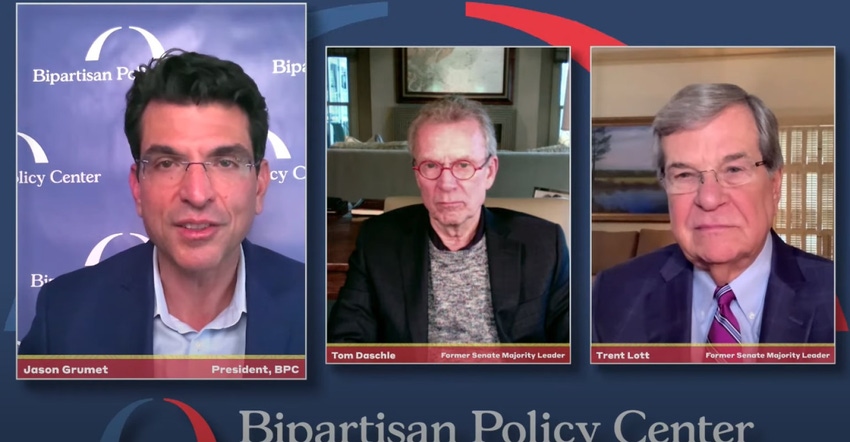
In the last two months since the November elections, I have listened in on dozens of calls focusing on what we can expect in the upcoming Biden Administration and a now Democratic controlled 117th Congress. Members from the both sides of the political spectrum have instilled some hope for bipartisanship, but that could be harder to accomplish as we approach inauguration day on Jan. 20 unless our political leaders make some sacrifices and start working together.
The events of January 6 will forever be seen as sparks in an environment already ripe for flames. Now it rests on the political leaders to put out those fires and rise above. House action on Jan. 13 to impeach President Donald Trump only looks to fuel the fire.
Former Senate Majority Leader Tom Daschle, D-S.D., called the impeachment attempt a “mistake” and “not the right course at all” in trying to find a way to bring the country back together after the elections and recent events. Daschle was supportive of a censure and holding the president accountable, but the impeachment and proceeding trial will only bring a more divisive environment. With President-elect Joe Biden set to layout his agenda in his first days of office, a trial in the Senate is unlikely to help in finding common ground.
Daschle and his fellow colleague Senate Majority Leader Trent Lott, R-Miss., were faced with many of the same dire political outlook at leaders Chuck Schumer, D-N.Y. and Mitch McConnell, R-Ky., are today. In an enlightening conversation hosted by the Bipartisan Policy Center on Jan. 11, Lott and Daschle looked back at when they were also faced with a 50-50 tied Senate after the 2000 elections, which also included an impeachment trial of then President Bill Clinton.
Lott says he wonders, hopes and prays that the events last week can be a wakeup call for a lot of people. “We’ve got to find a way to bring the country back together,” he says. “We need some bipartisanship, some non-partisanship.”
Entering into 2001, Lott was in a similar spot that Schumer is in today as Republicans then controlled the White House and with it the deciding vote in the Senate. Lott and Daschle made an agreement through an organizing resolution to offer shared leadership, recognizing that they had to abandon some of the members of their party to keep the agenda of all Americans on task. They accomplished a tax cut bill, appropriations packages and even the educational reform of No Child Left Behind.
Daschle says as majority leader in 2001 Lott set the tone, and the same responsibility lies with Schumer as he enters into the 117th Congress. Both the minority and majority leaders have roles to play, but as the majority leader the tone starts there. “I’m hopeful Democrats can demonstrate the same degree of courage as we work through some of the same challenges,” Daschle says.
He continues, “We need leadership so badly now. We need people to communicate. The country needs help right now.” That starts with Schumer thinking about how he can work with the new president and go forward in a bipartisan way to help with the pandemic and aftermath of economic fallout as well as an infrastructure bill. But it will take courage from both McConnell and Schumer, Daschle adds.
The Senate used to offer a colloquium where even if you didn’t agree with someone on the other side of an issue, you could still agree to disagree. During the Ronald Reagan and George W. Bush Administrations, the presidents invited Congressional leaders to the White House for weekly meetings.
Daschle says if he was Joe Biden, he would take a cue from those presidents and invite the leadership down once a week to create chemistry. “You can’t emphasize how critical that is and important to filter down through the caucuses as well.”
This chemistry will be important in potentially achieving as high as 60 votes or more on bills focused on infrastructure, restoring economic revitalization and possibly another round of COVID relief.
Daschle says if you stop looking at just achieving 50 votes, and instead look on accomplishing two-thirds or even three-fourths on measures, how dramatically would that improve the perception of Congress and its current dysfunction? If you see a number of things accomplished through broad support, it would offer an “interjection of enthusiasm in the country that we haven’t seen for a long time,” he adds.
Lott says he didn’t think things could get much worse than last year, and then what has happened in the last month with the election and the pandemic creates a need for change in the tenure of the debate.
Lott says Congress would be better off with improved chemistry, better communication and just listening to each other. Maybe Congress can start to see things return to a more regular order where bills are debated civilly in committee and amendments are allowed on the floor.
A tremendous responsibility now rests in the hands of Biden as well as Senate and House leaders. Lott says he hopes Jan. 6 was not the day the “music stops” but instead creates the opportunity for some self-evaluation and courage together.
“Our great republic needs to work together,” he says.
Daschle adds, “I think Joe Biden’s big responsibility and opportunity is to address the need for cohesion and find an agenda as there’s so much work to be done.�”
About the Author(s)
You May Also Like






